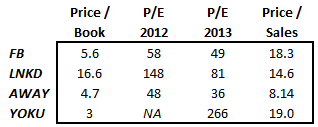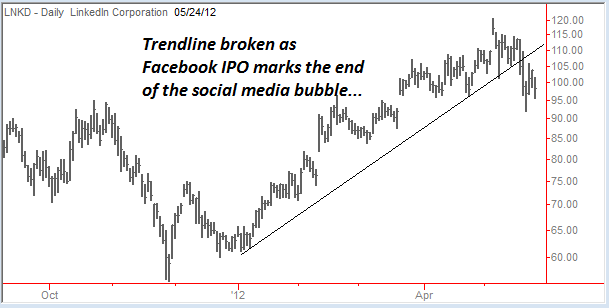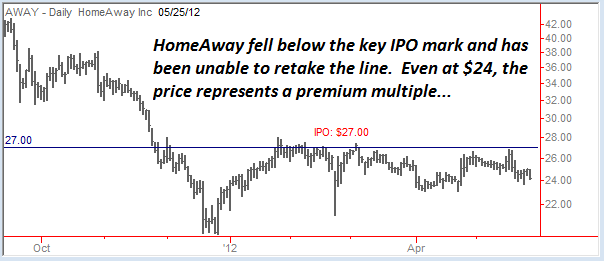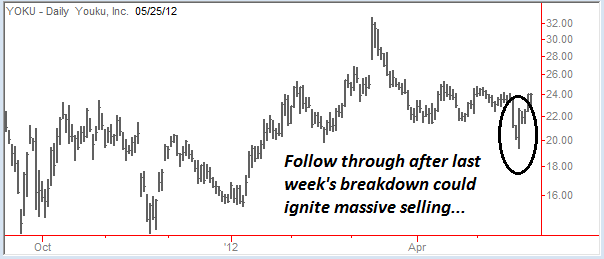So the Facebook (FB) IPO is now complete. Zuckerberg has collected his billions, the underwriters took their (discounted) selling commission, investors have taken a bath, and the class action suits are already being filed.
The transaction was a disappointment by any objective measure.
Investors who received allocations ahead of the transaction had a very short window to liquidate shares at a profit. And if you’ve ever played the IPO game before, you know that “flipping” shares on the first day is a great way to ensure you never see another IPO again (unless of course you’re a multi-billion dollar fund).
Investors who didn’t get shares on the deal – but still chose to buy in the aftermarket – are in even more hot water. Many of these buyers consider themselves “traders,” but have quickly transitioned to “investors” as underwater positions are held in the hope of getting bailed out by a rebound.
Even the underwriters got a bum deal. Since Facebook was the most widely anticipated IPO in years, it was considered a “privilege” to be part of the deal.
The underwriters were willing to price the deal for a much lower concession than they would typically charge for a transaction – because being a part of the FB deal would put them in the good graces of their clients, and help them win future investment banking business.
Morgan Stanley (MS) and the other underwriters have huge reputation risk after the most widely anticipated IPO of the decade broke below the deal price on the second day of trading – resulting in losses for their best clients.
Speaking of reputation risk, NASDAQ OMX Group (NDAQ) is in major damage control mode after botching the opening and leaving traders unsure of whether they were filled on orders – and at what price. Think about it: the exchange had literally YEARS to prepare for this transaction, and yet they completely dropped the ball. Facebook is already reportedly discussing plans to move their listing to the NYSE, and it is unlikely that the NASDAQ will be awarded a major IPO for years to come…
Joe Weisenthall makes an interesting argument that ALL investors were harmed by Facebook – whether they participated in the deal or not. The billions of dollars used to purchase new shares had to come from somewhere – with the net result being a twisted reverse quantitative easing program that sucked capital out of the market.
Social media stocks were liquidated across the board as investors reacted to the disappointment. At this point, it looks like the entire group is breaking down, with a number of key stocks representing attractive short candidates.
Over the next few weeks, the underwriters will undoubtedly try to prop up Facebook – in an attempt to control the damage. This buying pressure should set up some tremendous short opportunities as the group drifts and then continues to adjust to an environment that is focused on the true value of these names instead of the hype that has driven prices up to this point.
The majority of social media stocks are priced with a significant amount of “growth premium” built into their shares. Whether profitable, or still in the “building stage,” investors are paying up based on the expectation that these companies will continue to experience hockey-stick growth.
Unfortunately, potential growth is only part of the equation. Investors also have to price in the risk associated with the business models.
Social media stocks are in an extremely competitive environment. Groupon Inc. (GRPN) has to fend off a number of niche deal sites like Living Social which have low barriers to entry, and in many cases are more attractive to merchants.
Pandora Media (P) is facing rising competition from Spotify, and even the mighty Facebook has LinkedIn Corp. (LNKD) carving out a major piece of market share.
With the bubble now officially bursting, this competition becomes much more of an issue. Retail investors aren’t willing to buy these popular names at any price (“just get me IN” has turned to “I want OUT“).
Mutual fund managers realize that they will have a hard time explaining major social media positions to investors. And value investors aren’t going to be interested in supporting these stocks until they are trading at a mere fraction of current prices.
Based on the way capital typically flows into and out of “cult” or hyped story stocks, the next few weeks could offer some of the best social media short setups we will see all year – and also may represent the last truly good reward to risk social media setups for a number of months.
For the next few trading sessions, underwriters have an implicit duty to help prop up the share prices, so that institutional investors have a chance to minimize the damage. Propping up Facebook should also help other stocks in the group as retail investors decide not to panic since FB is “rebounding.”
A drift or mild rebound following breakdowns from last week gives us a chance to enter short positions using stop/limit orders which are triggered when the stocks resume their downtrend. Our risk points can be relatively tight, because once the stocks make their bearish continuation moves, they should pick up momentum significantly.
Below are three of our favorite social media short candidates that I will be watching for attractive entry points over the next several trading sessions…
LinkedIn Corp (LNKD) – Nosebleed Valuation and Broken Chart
- LinkedIn is currently trading near $100 per share, with analysts expecting $0.67 in earnings for 2012. Bulls make the argument that compelling growth justifies the price. But even considering $1.22 expectations for 2013, the stock is still trading at a multiple of 82.
- Traders have aggressively liquidated the stock, driving prices sharply below the key 20 and 50 day EMAs on strong volume. A reliable trend line (in place since the beginning of the year) has now been broken, giving trend followers an excuse for bailing out.
- Facebook continues to compete indirectly with LinkedIn, both for subscribers as well as for investment capital. In a competitive environment like this, profit margins are squeezed and premium equity prices are very likely to contract.

HomeAway Inc. (AWAY): Price Failure and Priced to Perfection
- HomeAway initially traded well above the $27 IPO price, but was unable to maintain the premium price as the hype wore off. Heavy resistance right at $27 provides a ceiling for the stock and a worst-case-scenario risk point for short positions.
- The company’s business faces low barriers to entry, and plenty of competition as firms like Google expand their business lines, and new Zuckerberg wannabes set up social networking sites.
- Investors are paying 48 times 2012 expected earnings, and 36 times 2013 expectations – a hefty premium for a stock that is projected to see decelerating earnings growth and has already seen the quarter-by-quarter revenue growth decline.

Youku, Inc. (YOKU): Adding Geopolitical Risk to Social Media Challenges
- Youku (the “YouTube of China”) faces all of the challenges that US social media stocks deal with, as well as the geopolitical risk of operating a social media site in China. The company has to comply with censorship regulations and treads a fine line between offering users a chance to express themselves, while still appeasing the government regulators.
- Although the firm has been operating since 2007, YOKU has yet to turn a profit and is not expected to post positive gains until 2013 (when analysts project 9c of earnings per share). The stock has already dropped from a 2011 peak of $65, but could have much farther to go based on a “reasonable” price to forward earnings metric.
- Investors are reducing their exposure to both social media AND emerging market equities, two powerful trends that add pressure to this social media stock. The $24 to $25 range represents an important resistance level and a follow through on last week’s breakdown could ignite massive selling.

Disclosure: This content is general info only, not to be taken as investment advice. Click here for disclaimer
